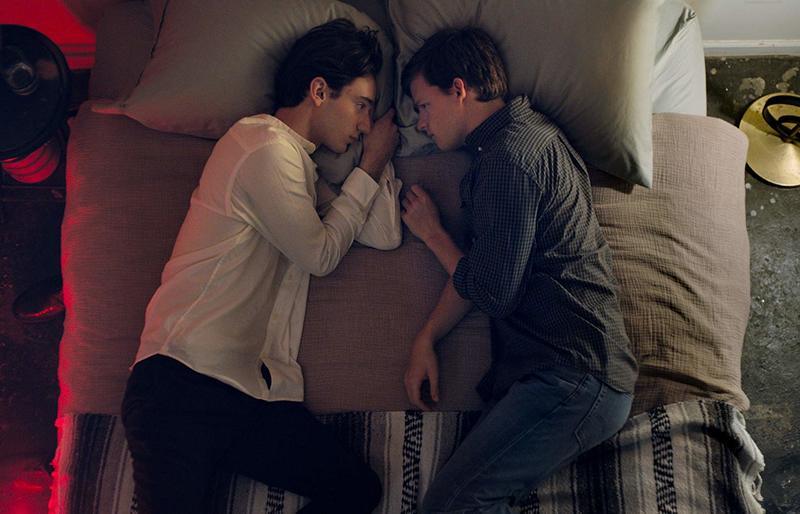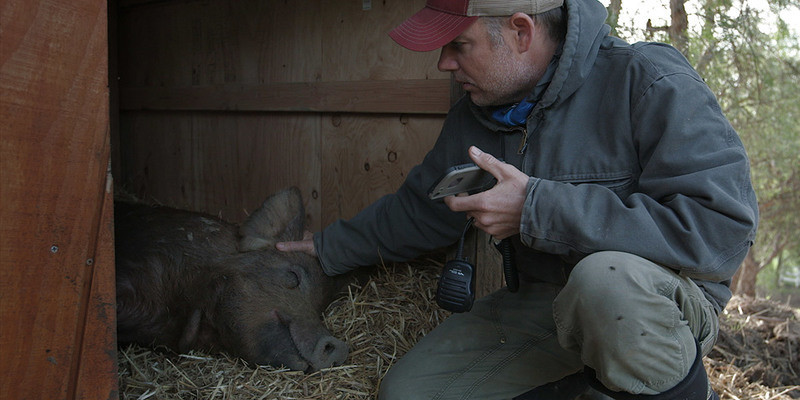
Perhaps to counter the era of post-truth and fake news, the 45th Telluride Film Festival, which wrapped yesterday on Labor Day Monday as per tradition, was chock full of movies based on cold hard facts. This might sound like a stretch at first; an observation made under the influence of dizzying mountain views, little sleep, and oxygen-starved thin air. Yet there is something profound about a long line-up of films that makes inquiries into true stories of the past as distant as 1819—like Mike Leigh’s “Peterloo,” which chronicles the tragic St. Peter’s Field massacre in Manchester—and as recent as 2011—like John and Molly Chester’s “The Biggest Little Farm,” an uplifting documentary about an ecologically thriving farm just outside of Los Angeles—calling the shots among generations of cinephiles riding the Mountain Village gondola. While this star-studded edition was attended by the likes of Nicole Kidman, Robert Redford, Emma Stone, Sissy Spacek, Melissa McCarthy, Ralph Fiennes, Laura Dern and Matthew McConaughey, the weekend in Telluride was marked not by celebrity, but by all kinds of real-life heroes: inspirational, troubled, downright problematic and even unsung.

The tone was set from the get-go, when festival patrons and members of the press were treated to a Friday afternoon screening of David Lowery’s pleasant throwback “The Old Man and the Gun,” starring Redford and Spacek. Based on a New Yorker article by David Grann, this was the true story of Forrest Tucker, the world’s politest bank robber, who successfully managed to break out of the prison 17 times throughout his crime-filled lifetime, last one being at the age of 70. Truth be told, despite the film’s disarmingly delightful tone pitched somewhere between “The Sting” and “Catch Me If You Can,” the clash of the problematic anti-hero at the heart of the story (who clearly benefited from his white privilege around unsuspecting eyes) and the screen legend that I wanted to root for, made “The Old Man and the Gun” a morally confusing watch for me. But this was still an affectionate, fitting send-off for the Hollywood and independent film hero Redford, who had recently announced his retirement from acting. “The Old Man and the Gun” brazenly banks on his decades-long screen persona, celebrating the highlights of an unparalleled career that defined an era.
You might have heard a thing or two about what’s now called the “‘First Man’ flag controversy”; a ridiculous, baseless offense some (who have not seen the film) took with Damien Chazelle’s masterful Moon landing saga for omitting the moment when astronauts Neil Armstrong and Buzz Aldrin planted the American Flag on the Moon. Take it from me and disregard it completely, for “First Man” is deeply yet quietly patriotic about a peerless American achievement that united the nation around a desire for scientific progress. An intimate and private look at the life of Neil Armstrong (Ryan Gosling) and his marriage to Janet Armstrong (Claire Foy), the melancholic “First Man” caps off the humanizing tale of an unassuming hero with John F. Kennedy’s rousing Rice Stadium speech, “We choose to go to the Moon in this decade and do the other things, not because they are easy, but because they are hard,” honoring a proud moment in history.
Making a giant leap from the 1960’s to the 1980’s, the festival’s first day came to a close with “The Front Runner,” Jason Reitman’s adequate political procedural on Gary Hart’s 1988 Presidential bid derailed by a sex scandal. The idealistic senator Gary Hart, the front-runner to win the Democratic nomination, is charismatically played by Hugh Jackman—he excels in the role of a complicated hero who miscalculates the cost of his actions, however private and personal they may be, in a conservative-leaning, easily scandalized country. Driven by smart dialogue and a sophisticated tone, “The Front Runner” is unfortunately a doomed watch due to its unavoidably ill-fated ending and the complex portrayal of free press who eventually brought a skilled candidate down. Equally uncomfortable is the parallels the film draws to today’s politics. An election slipping away from the hands of a qualified candidate due to an overblown non-scandal just cuts too close to the bone.

After Friday’s premieres, a pair of circumstantial, real-life anti-heroes emerged in the following days of the festival. Among this year’s across-the-board crowd pleasers, Marielle Heller’s terrific dark comedy “Can You Ever Forgive Me?” explores loneliness, addiction and the financially unsustainable nature of a career as a writer. With a script written by Nicole Holofcener and Jeff Whitty, “Can You Ever Forgive Me?” stars Melissa McCarthy in a dramatic turn, in the role of the washed out biographer Lee Israel, who forged letters by famous authors to make ends meet in the New York City of the ‘90s. “Can You Ever Forgive Me?” is both delightful and affecting in following the partners-in-crime Israel and Jack Hock (Richard E. Grant, channeling his “Withnail & I” persona), and empathetically portrays a pair of relatable anti-heroes teetering the fine line of dignity and desperation.
“‘71” director Yann Demange’s “White Boy Rick,” albeit worlds apart, also concerns itself with a community of people with only bad options to choose from and stuck in a perpetual cycle of crime amid guns and drugs. Telling the true, tragic story of Ricky Wershe Jr. (remarkable newcomer Richie Merritt) who, at the age of 14, was recruited by the manipulative FBI as a drug informant in the age of “Just Say No,” “White Boy Rick” vividly represents the neglected Detroit of the 1980’s and empathetically portrays a world hindered by laws designed to further thwart its struggling people.

The second one of this year’s movies taking on the evils of Christian-themed gay conversion therapy centers (after the Sundance-hailing “The Miseducation of Cameron Post”), writer/director Joel Edgerton’s emotionally affecting drama “Boy Erased” follows the adolescent years of Jared Conley (Lucas Hedges); the obedient son of conservative Southern parents (Nicole Kidman and Russell Crowe, both excellent). Adapted from Conley’s memoir, “Boy Erased” refreshingly acknowledges the eventual decency of a religious couple (who, admittedly could have used more screen time), and honors Conley’s courage to speak the truth about a psychologically damaging process (sometimes, fatally so) to bring widespread awareness to a procedure (still puzzlingly legal in several states) that jeopardizes the lives of countless young people.
The best film in this year’s crop, Alfonso Cuarón’s humanist masterpiece “Roma” respectfully honors a very different kind of hero; the unsung women, particularly one live-in maid, who raised, nurtured and saved him when he was growing up in the 1970’s Mexico City. Cuarón, who not only directed, but also wrote, shot, produced and edited “Roma,” observes Cleo (Yalitza Aparicio) and her employer Sofia (Marina de Tavira) through a clear-eyed lens, as the lives of the two women first run on separate lines and eventually merge against useless, destructive men with the backdrop of a politically-torn country. As personal and compulsively watchable as movies get (even when the most unimaginable kind of tragedy occupies the always-layered screen), “Roma” is a textured, Neorealist love letter to the unflappable matriarchal strengths and instincts that keep the crumbling world afloat.

I have eavesdropped on enough conversations in film queues and casual parties to know that “The Biggest Little Farm,” featuring two modern-day heroes who resurrected a once-barren farm outside of Los Angeles, is the sleeper hit of this year’s festival. Just seven years ago, John and Molly Chester were living an urban life as a photographer and personal chef, respectively. But to keep their promise to their nervous dog and give him an environment in which he can find happiness and peace, they left their chaotic, crammed lives behind and started from scratch as traditional farmers, eventually resurrecting an entire ecosystem with their tireless efforts, aided by knowledgeable experts and young people from around the world who flock in to learn these old-school methods.
“The Biggest Little Farm” is the hopeful parting note I’m leaving Telluride with; in awe of planet earth’s ability to regenerate and remembering it’s never too late to make a meaningful contribution. As a nation who once landed on the Moon, perhaps there is a thing or two we can do around here too, in order to reverse the damage we’ve caused in the persistent footsteps of the Chesters’.
Tomris Laffly is a freelance film writer and critic based in New York. A member of the New York Film Critics Circle (NYFCC), she regularly contributes to RogerEbert.com, Variety and Time Out New York, with bylines in Filmmaker Magazine, Film Journal International, Vulture, The Playlist and The Wrap, among other outlets.





